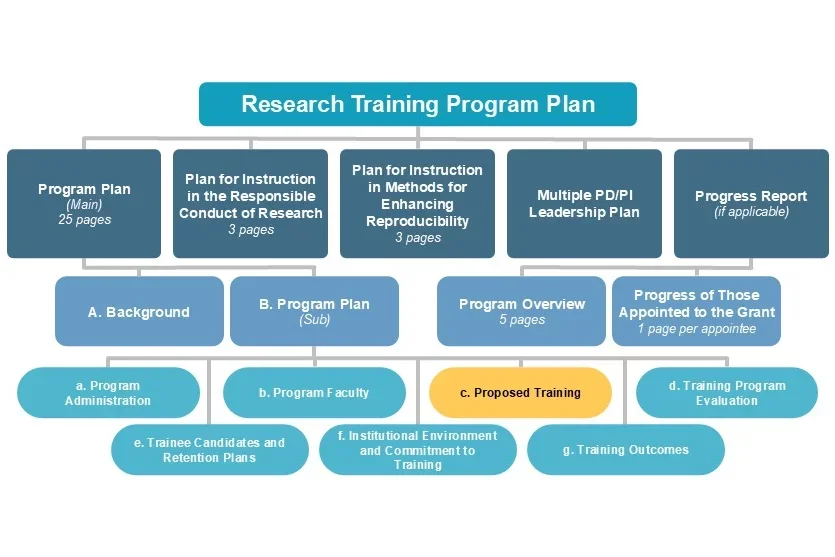Proposed Training
Alert

Proposed Training is a sub-section of the 25-page Program Plan’s “B. Program Plan” component. Describe how the proposed training program’s objectives, design, and direction will provide effective preparation for a research career in the subject area. Activities should use evidence-informed approaches in trainee learning, mentorship, and professional development. Include the following:
Trainee Information
- Demonstrate trainees are appropriately distributed and prepared academically to be productive in the proposed program
- Include training level(s) and number of trainees
- Prove that trainees have the academic and research background needed to pursue training and that there are plans to accommodate differences in preparation among trainees
- For post-doc trainees only:
- Include proposed distribution by degree (e.g., M.D., Ph.D.)
- Describe the trainee’s prior access to and responsibility for patients, including time commitment
Coursework Information
- Demonstrate that the curriculum is providing robust state-of-the-art skills and information that are appropriate to the subject area
- Describe how mentors and research areas are chosen and how trainees will be guided
- Provide examples of programs, including:
- Curricula, which should include:
- Scientific reasoning
- Rigorous research design
- Relevant experimental methods
- Relevant quantitative and data science approaches
- Data analysis and interpretation
- Data transparency, sharing, and storage
- Research integrity
- Skills development for presentations, publications, networking, and critical thinking
- Degree requirements
- Didactic courses
- Laboratory experiences
- Qualifying examinations
- Other training activities such as seminars, journal clubs, etc.
- Curricula, which should include:
- Describe coursework, including:
- Research opportunities and the extent to which trainees will participate directly in research
- Activities designed to develop technical and/or professional skills
- The duration of training (usual period of time required to complete the training offered)
- Describe how the trainee's performance will be monitored and evaluated including mentoring plans, individual development plans (do not include actual IDPs), and other ways to verify structured career development advising and learning opportunities
- For multi-disciplinary/departmental programs, describe how the different components will be integrated and coordinated and how they relate to trainee’s experiences
- Clinician training programs only:
- Describe the interactions with basic science departments and scientists
- Ensure proposed training will provide significant foundation for trainees to pursue independent research careers
- A minimum of 2 years of research training is generally expected for all post-doc trainees with health professional degrees
- OPTIONAL human subjects training: If trainees may be involved in human subjects research funded by other research grants, include a brief description of those opportunities
- Renewals only: some restrictions exist for the type of coursework information that can be provided, please visit the Renewal Applications webpage for more details
Career Development Information
- Provide trainees information about the overall employment landscape, variety of applicable careers, and common outcomes for program graduates
- Strongly consider trainee outcomes on a publicly accessible website (example directory)
- Describe activities that develop necessary networks and professional skills, including how:
- The program will engage a range of potential employers, including industry
- The program will provide experiential learning opportunities (i.e., internships, shadowing, informational interviews, teaching opportunities)
- Trainees will receive grant writing training applicable to their career stage
- Trainees will learn to teach/communicate research to a wide audience (i.e., discipline-specific, across disciplines, the public)
- Describe relevant mentor and staff involvement in activities that promote trainee career progression
Note: If proposing both pre- and post-doc positions, be sure to spend equal attention on pre-doc and post-doc programs to avoid the perception of imbalance
Page Limit: Must fit within the Program Plan’s 25 page maximum. About 5 pages.
Format: Section header: “B. Program Plan” | Subsection header: “c. Proposed Training”
Component Instruction Index
Access detailed instructions for each component of the Research Training Program Plan. If you have further questions contact GSUTraining@mednet.ucla.edu.